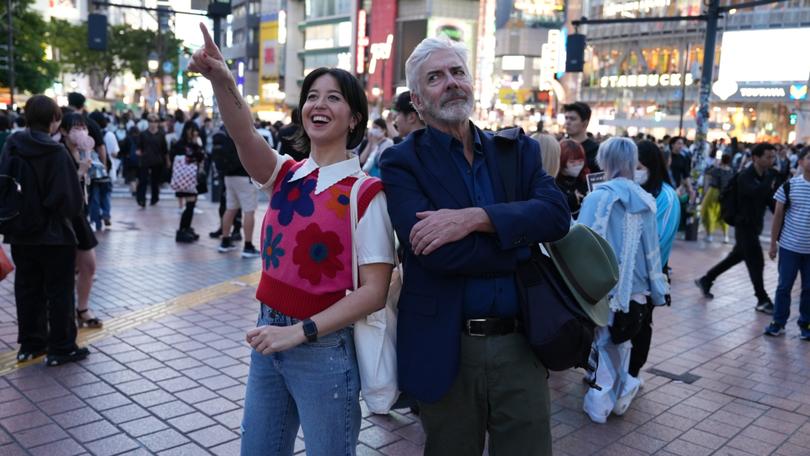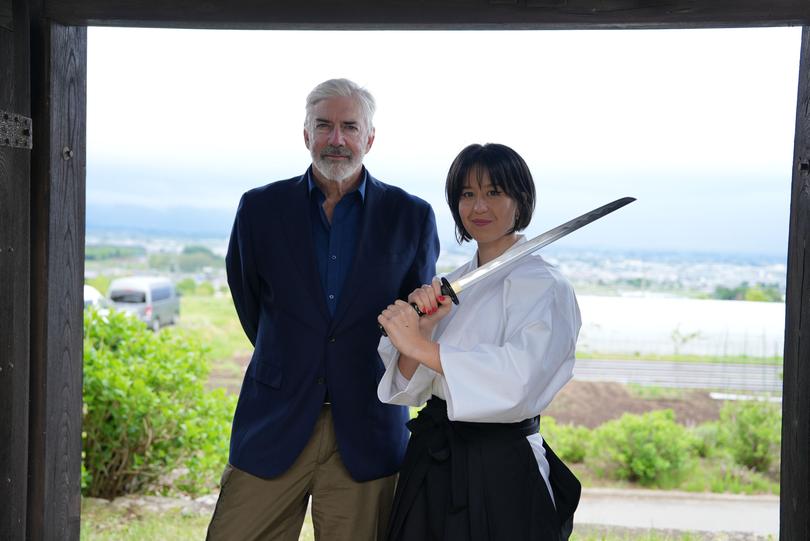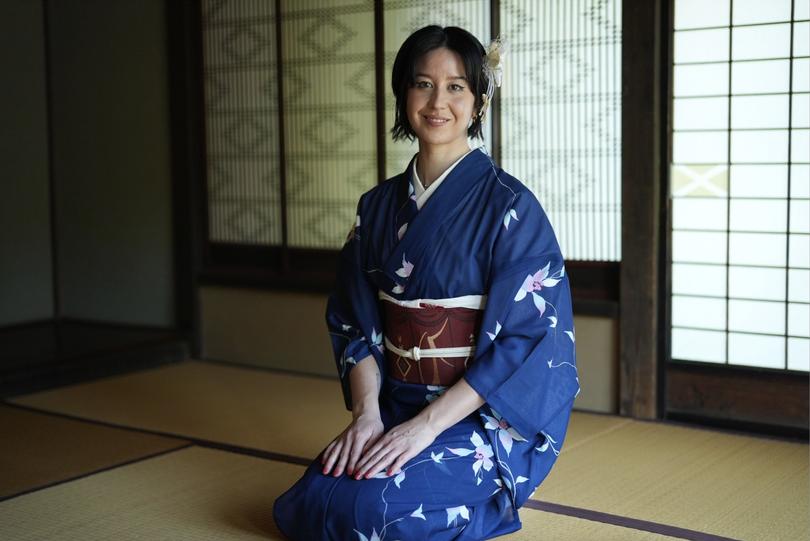Shaun Micallef’s Origin Odyssey: How Nina Oyama came to terms with her Japanese heritage

Comedian and actor Nina Oyama had always been told she was descended from samurai but she never had any proof — until now.
Oyama was in Japan with Shaun Micallef for his new SBS series Origin Odyssey — on which he travelled to the ancestral lands of and with six comedian guests — when she was given a koseki, which is an official document that lists her family’s background. There, in ink, were samurai ancestors.
It wasn’t just on paper though. As part of the show, she was swathed in a kimono, handed a katana sword and successfully sliced an apple in half as it was being thrown at her. Seven times!
Sign up to The Nightly's newsletters.
Get the first look at the digital newspaper, curated daily stories and breaking headlines delivered to your inbox.
By continuing you agree to our Terms and Privacy Policy.“Don’t mess with me, I’m descended from samurai,” Oyama tells The Nightly, only half-joking.
“I’m good with a sword, you don’t know what I’m capable of, even I don’t know what I’m capable of.”
That last point was certainly true when Oyama joined the project, which she was reluctant to do because she had an uneasy relationship with her Japanese heritage. Oyama was born in Sydney to a white Australian mother and a Japanese father who had met in Japan.
Throughout her childhood, she learnt to speak Japanese and even took the subject in school, but like many kids who grew up straddling two cultures, she struggled to reconcile with either.
“I have a complicated relationship with Japan, and so going there without my family for the first time was a really emotional experience for me. It was a breakthrough,” she recounted.
“I had cut myself off from the possibility of ever embracing Japan as my own culture. I have felt this weird shame and guilt about not being able to speak the language well and not feeling connected to my family over there, and lot of them have passed away.”
That disconnection is due in part to her sometimes-strained relationship with her parents, and with her father being her only link to Japan, it was as if a door had been shut in her face.
She felt she was a “failure at being Japanese” and that she “didn’t deserve” to be part of an incredible culture.
That’s a dark and vulnerable place to start from, so going on this journey with Micallef — who she described with affection as her “dad for a week” — was a big deal. It was about overcoming her internalised shame.
Despite the initial apprehension, she realised she was more bonded to her heritage than she realised.
“I forgot I could speak OK Japanese, I was fine going into shops and ordering at restaurants, so it was nice to know that I’m not as much of a failure as I think of myself,” she said.

Putting on a kimono and holding a katana wasn’t just about recreating some Hollywood fantasy, it was about giving herself permission to not feel like a fraud.
I really didn’t expect to feel that I belonged so much.
Over the week, which included travels to her father’s hometown of Kesennuma which had been hit hard by the 2011 tsunami, being there on the ground, walking streets she had walked before as a kid but doing it with the added lived experience of an adult, Oyama felt her anxiety melting.
“Coming back and feeling better about things is a f**king miracle,” she said.
“I get to define my connection to Japan instead of letting my family — my white Australian family and my Japanese dad — define it, or to let my previous shameful thoughts about myself define it.”
When she came home to Sydney, she showed her father the koseki, which he loved and helped him discover parts about his family tree.
“He hasn’t been back in a while either, and there’s so much he didn’t know, and it made him curious and excited to go back to Japan too. It did change things in a positive way.”
Micallef wanted Origin Odyssey to be a genuine journey of discovery for his guests — and the audience.
“My guests on the show who are younger, there is a certain amount of visceral relationship with these ancestral lands that they might not be aware of.
“(For Oyama), I’m glad she found it a positive experience because that was my concern with everybody: that it not be a trial for them, that it would be something good and something that helped them move forward if they were stuck somewhere in terms of their family history.”

Not everyone on the series, which also included Aaron Chen in China, Lizzy Hoo in Ireland, Arj Barker in India, Michael “Wippa” Wipfli in Switzerland and Dilruk Jayasinha in Sir Lanka, had the same tension to their heritage, but it was always about re-affirming their connection.
“As we get older, we get interested or have more of an understanding of our parents, and in how we ended up here and how they ended up where they are and so on backwards,” Micallef added.
A year ago, Micallef and his 87-year-old father visited his dad’s home country of Malta, which they had never done together.
“We got to spend some time together that we wouldn’t have otherwise done, but especially in this place, where the stories become more nuanced. Dad is standing outside his (old) house and so the level of detail of the tales he tells is greater than it would’ve been if we were just home in Australia.
“Whenever anyone talks to me about this project, I say, ‘Look, don’t leave it too late’. If you’re able to do it, you really should because it’s such a wonderful experience.”
Shaun Micallef’s Origin Odyssey is on SBS weekly from September 24

